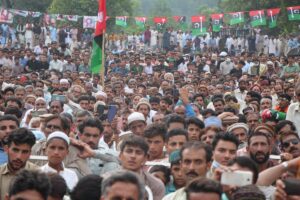The UN Human Rights Council at its 49th session in Geneva criticized the authorities of Tajikistan for ‘the ongoing practice of suppressing political dissent’ and ‘creating an atmosphere of fear and repression’ in the Gorno-Badakhshan autonomous region.
Michelle Bachelet Jeria, the UN High Commissioner for Human Rights, said at the 49th session on March 7 that repression against the political opposition continues in Tajikistan.

“An increasing number of members of opposition groups are being sentenced to long prison terms. This happens in the course of trials that don’t meet the standards of due process,” said Bachelet.
Back in 2020, the UN Working Group on Arbitrary Detention called on Tajikistan to release 11 convicted members of the Islamic Renaissance Party (IRPT) banned in the republic. In 2018, the same UN structure demanded that Dushanbe immediately release the life-sentenced 60-year-old Mahmadali Khait, one of the deputies of the IRPT’s chairman.
The authorities of Tajikistan have always denied politically motivated arrests of members of the opposition and call all judicial decisions in such cases fair and impartial.
Bachelet also touched upon the human rights situation in GBAO in her report.
“…Violence between security forces and demonstrators in November 2021 in Gorno-Badakhshan autonomous region also significantly worsened the human rights situation in the area, creating a climate of fear and repression. I regret the ongoing Internet shutdown in the region. Such shutdowns clearly violate human rights,” said the UN High Commissioner for Human Rights.
This is the first reaction of the UN representative to the November events in GBAO, which began after the death of a local resident Gulbiddin Ziyobekov during a special operation to detain him, carried out by officers of the State Committee for National Security of Tajikistan. Mass protests in the administrative center of GBAO, the city of Khorog, led to violence, as a result of which two more people were injured and died, and about twenty were hospitalized.
After an agreement was reached that the authorities would conduct an objective investigation into the circumstances of the death of Gulbiddin Ziyobekov, Gulnazar Murodbekov and Tutisho Amirshoev, remove all posts, restore access to the Internet in GBAO and not persecute the protesters, the residents stopped the four-day protest. However, four months later, in February 2021, the activists of civil society in GBAO appealed to the UN High Commissioner for Human Rights in order to draw the attention of this organization to the events in Khorog.
“None of the promises of the authorities have been fulfilled. Four months have passed since the protests, but not a single representative of the security forces has been held accountable for the killings of civilians,” said one of the representatives of civil society in GBAO, on condition of anonymity. “Internet access hasn’t been restored, pressure on the region’s residents is increasing, additional military forces have again arrived in the autonomous region.”
Source: Acca Media















